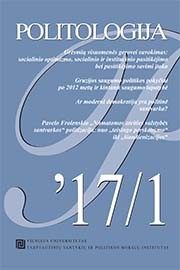Ar moderni demokratija yra politinė santvarka?
Is Modern Democracy a Political Regime?
Author(s): Gintas KaraliusSubject(s): Political Philosophy, Political Theory, Recent History (1900 till today), Government/Political systems, 19th Century
Published by: Vilniaus universiteto leidykla & VU Tarptautinių santykių ir politikos mokslų institutas
Summary/Abstract: The purpose of this article is to introduce an innovative approach to the theoretical debate of the last two centuries on how to appropriately conceptualize modern democracy. The main argument that is being put forward by the analysis is that the common reliance on the assumption of pre-modern political philosophy, that democracy is a certain type of political regime or at least a form of rule, has become insufficient to cover the influence and scope of its modern meaning and practical use. Political theory faces the risk of becoming misguided and prejudiced, if the problem of re-conceptualizing democracy is not taken seriously into account. The article tends to offer new insights on the ongoing democratic debate by focusing on one simple question: can modern democracy be understood in terms of a political regime or should it be viewed as a distinct entity? The field of study relevant to our analysis of democracy ranges from Enlightenment thinkers, such as J. J. Rousseau and Voltaire, to XIX–XX century political philosophers (like A. de Tocqueville and C. Schmitt) and some contemporary theorists, like P. Manent. The article starts with explanations, why it is important to look deeper into the conceptual difficulties of modern democracy and why political philosophy and its theories on political regimes are crucial for such a task. Parts 3–5 of the analysis tend to prove that the only way to appropriately understand modern democracy is to identify and question its basic assumptions: the sovereignty of the people and social equality. The final part of the article – part 6 – offers a critique of understanding modern democracy as a political regime. The critique identifies three main theoretical problems, inherent to the discussion on modern democracy, which make it difficult to avoid contradictions when applying the name “democratic” to various political regimes. The article concludes several points: First, democracy is not a political regime in a pre-modern sense of the term, which is an assumption still widely taken for granted in political theory. Democracy should be seen as a universal principle of legitimation of power, which can be applied by various regimes. Second, political philosophy faces the danger of adopting an oversimplified understanding of democracy as merely an institutional form of rule (a view per¬petuated by social sciences); as well as the danger of conceptualizing democracy as a substance-free and abstract ideal, applicable to all forms of government. Both of these concepts fail to acknowledge the scope of democracy and thus should not be seen as satisfactory. Third, theoretical discussions on democracy suffer from three conceptual shortcomings, which make it impossible to speak about democracy as a political regime. The three problems are: 1. a tendency to see democracy as an ideal concept with no need of practical grounding; 2. making democracy a formal concept with no need of references to its normative nor positive substance; 3. making democracy a pseudo-religious entity by imitating structural elements of Christian religion: faith in a universal nature of humans, an all-powerful sovereign (the people), messianic mission. Lastly, the article generalizes that political philosophy has an obligation to demystify the concept of democracy in order to re-emerge discussions about the substance of different political regimes. For this purpose the concept of loyalty should be taken into account. If we want to prove that a certain state corresponds to a certain political regime, we must try to understand why its subjects maintain loyalty to a specific form of rule. Only unprejudiced political philosophy is capable of such a task, that’s why it should avoid taking the concept of democracy for granted.
Journal: Politologija
- Issue Year: 2017
- Issue No: 1 (85)
- Page Range: 102-131
- Page Count: 30
- Language: Lithuanian

